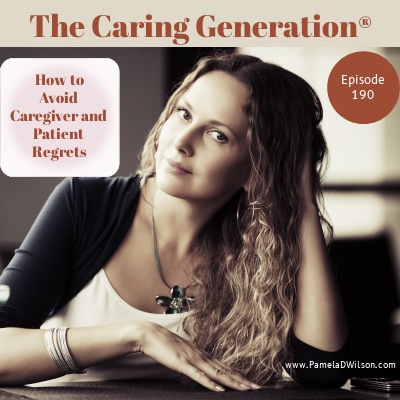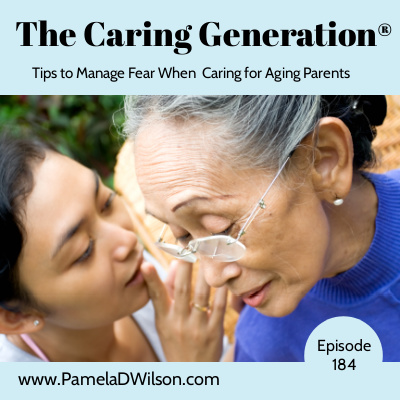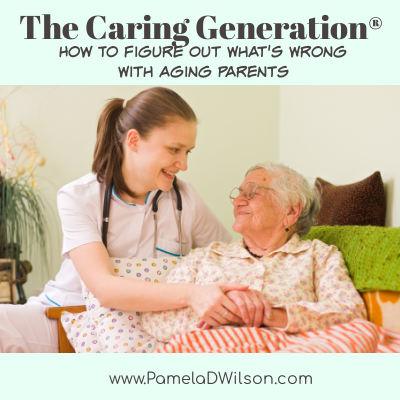Are Hip Fractures for Elderly Parents Serious?
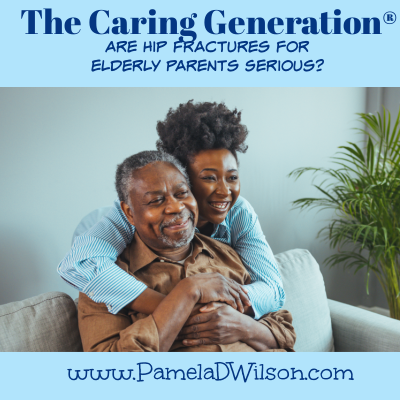
The Caring Generation® – Episode 148 August 24, 2022. Are hip fractures for elderly parents serious? Caregiving expert Pamela D Wilson discusses the physical and mental aspects of recovering from a hip fracture or serious illness to regain independence for elderly parents and adults of all ages.
Have a question? Follow and connect with Pamela on her social media channels of Twitter, Linked In, Facebook, Instagram, and YouTube or complete the caregiver survey on her website.
To listen to the caregiving podcast, click on the round yellow play button below. To download the show so that you can listen anywhere and share it with family, friends, and groups, click on the button (the fourth black button from the left) below that looks like a down arrow. Click the heart to go to Pamela’s Spreaker podcast page to like and follow the show. You can also add the podcast app to your cellphone on Apple, Google, and other favorite podcast sites.
Are hip fractures for elderly parents serious? How do injuries or illnesses affect all adults, including those who may be caregivers? A hip fracture or any significant injury is life-changing, especially for elderly parents.
Are Hip Fractures for Elderly Parents Serious?
Watch More Videos About Caregiving and Aging on Pamela’s YouTube Channel
First, there are obvious issues like parents’ ability to walk and get around The house, drive a car, shop for groceries, bathe and perform everyday activities, which can be challenging after a hip fracture. But there are many other issues that family caregivers don’t consider or even know to talk about unless there has been a similar life experience.
Gaining a broader perspective about injuries and illness can give caregivers an entirely different perspective on how to support mom or dad recover from a hip fracture or any serious health concern.
How Long Does an Elderly Person Live After a Hip Fracture?
Let’s begin by discussing statistics related to recovering from a hip fracture for older adults. Breaking a hip or recovering from something like a torn rotator cuff in the shoulder is a significant life event.
According to research by Murthy in an article called Physicians Perspectives of Prognosis and Goals of Care After Hip Fracture:
- The percentage of older adults who die within one year of fracturing a hip is between 25 to 30%
- The time to recover is based on the physical strength and health of elderly parents before the hip fracture
- Recovery times can be anywhere between 6 to 12 months.
- Only 40% of the elderly who participate in ongoing physical therapy will be able to walk as well as they did before breaking a hip
- Another 40% will never walk as well
- 20% will experience a significant decline in physical ability and lose their independence.
There is a combination of factors in the reasons elderly parents experience falls or other injuries. If you are a family caregiver, gaining more knowledge is essential to answer the question, are hip fractures serious for elderly parents?
The information you learn can prevent you from breaking a hip or experiencing a physical injury or help you recover more quickly. So, what happens when an elderly parent falls and breaks a hip?
What Happens When Elderly Parents Break a Hip?
Mom or dad are usually taken to the emergency room by 911 and then admitted to the hospital. An orthopedic surgeon visits and decides to operate within 48 hours.
A decision is made about the type of operation performed. Options are a full or partial hip replacement, inserting a pin, or, sometimes no surgery if your parent is very frail is decided.
Assuming surgery occurs, depending on the doctor’s orders, the next day the hospital staff wants your parent to begin standing or walking. In some other cases, a parent may be non-weight bearing status which means no standing is allowed on the leg where the hip fracture occurred for a stated length of time.
Because hip fractures occur suddenly, creating an emergency medical plan for elderly parents is important. Listen to The Caring Generation Episode 147 for more on this topic.
In either situation, it is highly likely that your parent will be discharged to a nursing home, a skilled nursing community, or a rehab community. These are all different terms used for a nursing home that provides rehabilitation by way of physical therapy and other treatments to help a parent regain physical function.
A parent’s length of time in a nursing home varies greatly. At a minimum, Medicare or a supplemental health plan pays for 14 to 20 days.
Hip Fractures: Planning for What Happens Next
As the family caregiver, this is your time to determine the next steps, which can be challenging if there are a lot of unknowns. Questions to ask:
- Will your parent be able to return home and regain the prior level of independence?
- Will mom or dad need daily assistance? If so, who will be the caregiver? Will this person be you or someone you hire?
- If mom and dad can’t return home to live independently will you keep them at the nursing home and pay the going rate? Daily rates for nursing homes range from $150 to 350 or more per day, depending on the city where they live.
- Will mom or dad temporarily stay in a nursing home and eventually be able to live in an assisted living community?
- How much money does your parent have available to pay for care?
- Will your parents need to apply for Medicaid?
There are a lot of questions to ask and many options to consider.
Early Discussions About Care Planning Are Critical
The sooner you begin discussions about planning for what happens next, the more time you will have to make the best plan. So along the lines of caregivers asking if a hip fracture for an elderly parent serious is the consideration of what your parent was like before the accident?
- Was this an unexpected accident like a fall off a ladder?
- Was your parent already physically weak and in poor health which likely led to the fall?
Your ability to answer these questions accurately can predict the next steps.
Another critical factor is the interest level and realistic understanding by mom or dad of the daily time and effort required to put in the work to recover physically. This aspect can’t be ignored because the answer is the primary determinant of whether mom or dad can live independently again.
So how do you know? Ask these questions.
- What was your parent’s daily routine before the fall? Were they physically active or did they sit in a chair and watch television all day?
- Do parents eat nutritious meals?
- Are they in excellent, good, or poor physical condition?
- How many health conditions are diagnosed?
- How many medications taken?
- Are parents socially active?
- What is their mental state? Are they generally optimistic and happy or depressed and anxiety-filled?
- Were they able to manage all of their activities without any assistance?
- If help was needed before the fracture, for what activities, how often, and for how much time?
Being realistic about the answers to these questions may result in facing hard truths or being in denial about the next steps to take. While many family caregivers look at parents and think that recovering from a hip fracture will be easy—it’s more complicated than you might think.
For more on Learning How to Respond to Negative Life Events, Listen to The Caring Generation Podcast Episode 143.
Reasons Elderly Parents Refuse Care
 Frustrated caregivers report that their parents, a spouse, or another family member talk about getting better but don’t take any action.
Frustrated caregivers report that their parents, a spouse, or another family member talk about getting better but don’t take any action.
This gap between wanting to get better and understanding what changes must happen to get better is very common.
Here’s a practical way to think about gaps between desires and results. If you work, your company sets annual goals and has a business plan, sales plan, marketing plan, or production plan. There are probably a lot of processes and systems that employees use.
If you are responsible for creating a personal or business plan, you might have used something called SMART, or you may be familiar with the acronym. SMART translates to Specific, Measurable, Achievable, Realistic, and Time-Phased.
SMART Planning for Recovery from a Hip Fracture
When you use the SMART process to set a goal or make a change, whether in business or personal life, you are more likely to achieve the goal because you can think through the process. If you’re not familiar with SMART, this document offers more information.
So let’s relate SMART to a parent recovering from a hip fracture. The first question is who is doing the activity and what Is the activity? The “who” is your elderly parent? The obvious activity is physical rehabilitation—but it’s a lot more than that.
To keep moving forward to answer the question are hip fractures for elderly parents serious, let’s talk about what most caregivers, healthcare providers, and physicians fail to consider. To be realistic, unless you have personally experienced a severe injury or know someone who has it may be difficult to understand the recovery experience of elderly parents.
Creating Measurable Steps for Recovery
When you think about making any change in your life—whether it’s physically improving after breaking a hip, losing weight, or any other activity—consider how much change is necessary. In the SMART acronym, this is the M for measurable.
So for a parent breaking a hip who was not active before the hip fracture, how much time and effort will need to be committed to exercise? Going from zero exercises each day to 30 minutes or an hour or 90 minutes is a significant, major change.
The question to ask is—is this degree of change possible or achievable specific to what time frame? For example, is 10 minutes all a parent will be able to exercise before they are physically exhausted? How much time will it take to increase this to 20 minutes, 30 minutes, or an hour?
Is Total Recovery Achievable?
The next letter in the SMART acronym is A for Achievable. What can be achieved or accomplished given the current situation?
- What difficulties or constraints exist?
- Does an elderly parent have diabetes, a heart condition, or COPD that will impact the ability to exercise and commit to a rehabilitation program.?
- Will your parent exercise by him or herself, or will you or someone else have to physically be present to make this happen?
- Is your parent motivated to create and carry through with this type of improvement plan?
Be Realistic Without Giving Up Hope
The R in smart is realistic. We’ve all set goals that took longer than expected to accomplish because of underestimating time, effort, motivation, and abilities.
When results don’t happen right away, many people become discouraged, and rather than continuing with a plan—they give up. So in the realm of being realistic, do you or an elderly parent understand the risk of expecting immediate results and giving up?
Giving up means having more health issues and needing more care. When possible discuss the options to improve the situation and the consequences of not taking action.
This could mean that elderly parents will not be able to live at home. As the caregiver, you may not be able to commit more time so other options will have to be considered. If parents are unable to improve plan for the worst-case scenario and hope for the best.
Creating a Timeline for Recovery
The T in smart is time-phased. The time to recover from an injury is different for every person.
Are hip fractures for elderly parents serious? The answer is yes, depending on parents’ prior level of daily physical activity, physical strength, balance, nutrition, level of social activity, mindset, motivation, outlook on life, and how well they take care of their health considering any chronic diseases that have been diagnosed.
Age and health factors significantly impact the ability to recover from any injury or illness—major or minor. A 20-year-old body in good health recovers much more quickly than an 80-year-old body in poor health.
The challenge is that unless individuals take an interest in health at an early age, they may miss out on doing everything it takes to be a healthy 80-year-old who is physically and socially active. Being 80 and healthy takes consistent, ongoing effort over many years.
Find a Goal System That Works
Using the SMART process. Specific, Measurable, Achievable, Realistic, and Time Phased activities performed with a goal in mind can help anyone get from A to Z. If the SMART plan isn’t a fit for you, find another system that you or an elderly parent will use.
Mental Aspects of Recovery
The next area that answers the question are hip fractures for elderly parents serious, is the mental aspect of recovery from an injury. Mental considerations about the interest and ability to recover from injury are more significant than imagined.
How many of you have been in an unexpected accident for which you were hospitalized? How long were you hospitalized, and what length of time did it take you to fully recover?
If you have had any serious health experience, you may be a more empathetic caregiver for an elderly parent with health issues or one who falls and breaks a hip.
Starting with the mental component at the most basic level. An elderly parent breaks a hip, has surgery, goes to rehab, and then returns home. Technically the surgery was a success.
Time-Phased Recovery: 6-12 Months or Longer
After surgery, there is s 6-12 month period of time where everything else has to come together. Mom or dad needs to learn to walk again and do all of the activities they used to do. They may be thinking, wow, this sucks.
I used to be able to do all of these things. Now I have to start at the beginning and learn how to physically do them again with a new hip.
Or I used to walk 3 miles a day. Today I can only walk 50 feet. How long will it take me to get back to walking 3 miles a day?
Along with being hospitalized and returning home, being tired all the time can result from low iron in the body can result in physical exhaustion after doing the simplest of activities. A parent takes a shower and has to go take an hour’s nap.
There may be a fear of doing too much physically that will result in another fall and hospitalization. Or let’s relate this to a 30-year-old who suffered a leg fracture and returns to work. The effect of physical pain on the mind and body can be significant.
While a 30-year-old quickly returns to work, exhaustion may occur after three hours with a need to return home. Pain may occur at night with worry about having to return to the hospital for treatment.
Health Experiences Can Result in Emotional Trauma
Experiencing any significant health emergency or an accident and being hospitalized can result in mental trauma, stress, and anxiety that can feel overwhelming. This aspect of health can be very difficult for family caregivers to understand.
What if you are middle-aged and an accident totally turned your life upside down? You had a good job, but now you can’t work. You’ve lost your income, and you’re trying to find a way to support yourself. Each day is a mental and physical struggle to keep going.
Just because a person appears the same on the outside, on the inside they may feel like a totally different person. For an elderly parent recovering from a hip fracture, there may be a point where they max out on the amount of progress they can make.
Mentally accepting that ability will never be the same again can be depressing after hope existed for a full recovery. It can be challenging to accept and adjust to thinking, “this is as good as it’s going to get.”
Processing Grief About Changes in Daily Abilities
 Memories may exist of hiking in the woods for hours, playing golf or tennis, attending events with friends, and then realizing that participating independently in these activities is all in the past.
Memories may exist of hiking in the woods for hours, playing golf or tennis, attending events with friends, and then realizing that participating independently in these activities is all in the past.
Accepting and positively coping with losses requires a lot of mental positivity and control.
The idea of accepting that priorities have changed is another mental aspect of realizing that hip fractures for elderly parents are serious or the ways in which an accident permanently affects the life of a younger adult.
Most people want to return to work or resume activities they did before the accident.
This is normal thinking, but a return to doing things as before an accident can be a lengthy process that takes much more time than anyone expects. During a recovery period which again, depending on the event, can take 6-12 months, there can be temporary and permanent changes in life.
These changes can result in feeling disconnected from loved activities, friends, and family and the challenge of dealing with an uncertain future. Returning to being independent is a desire of most people who experience an injury regardless of age.
Adjusting to Changing Priorities
There may be a time when an injured person accepts a change in priorities. For example, a man who enjoyed mountain biking several times a week agreed to give up the activity because his family warned him against getting injured again.
Individuals who want to return to work full-time realize may that they don’t have the energy for an 8 to 10 hours day. So they work part-time or give up employment.
The experience of physical changes, trauma, and related mental aspects can significantly reprioritize aspects of life that people feel to be important. In addition, anxiety, fear, depression, and fear of another trauma can delay or derail the ability to fully recover.
Recovery is More than Repairing a Broken Hip
Recovery involves more than traditional medicine—like mending a fracture or an injury. As a caregiver for an elderly parent experiencing health problems, how often do you talk about fear, anxiety, disappointment, or loss surrounding an inability or difficulty to perform once enjoyable activities?
If I had to guess, these conversations rarely, if ever, happen. Caregivers are generally encouraging.
Adult children want elderly parents to be proactive in improving their health. Caregivers are cheerleaders. As a result, adult children miss or ignore the unspoken signs indicating why elderly parents appear to refuse to help themselves or participate in care.
Part of these concerns results from the discharge process from hospital to home or from rehabilitation center to home. When physicians discuss recovery in hospitals or rehab centers, the discussion mainly revolves around physical recovery.
There may not be discussions of what it takes to return to work physically and mentally. What it takes to “do what I used to do.”
Additionally, concerns may exist about what situation might necessitate a return to the hospital or how to manage pain. Physicians rarely discuss aspects related to mental recovery from an injury.
Therapy or Support Groups Help with the Emotional Aspects of Recovery
Requesting a referral to a therapist who can discuss worry and anxiety about returning to a normal life or how to process the bad news that a full recovery isn’t possible can be helpful. Participating in patient and caregiver support groups can significantly help as some attendees may be further along in the rehabilitation process and can share their experiences.
Additionally, navigating the healthcare system after a hospitalization can be challenging. While the recommendation is to see a primary care physician or a specialist like an orthopedist as soon as possible, how is this possible for a person who is physically unable to walk or drive a car?
Another aspect related to if hip fractures are serious for elderly parents is post-treatment coordination. Medical bills show up in the mail and have to be paid. Communication and coordination between different doctors are important.
Who is prescribing and managing what medications? What side effects can result from pain medications or blood thinners prescribed during hospitalization and so on?
Are Hip Fractures for the Elderly Serious? How to Look Beyond the Obvious
Rather than an accident being solely seen as a broken hip, arm, or some other injury—looking beyond surgery and the healing of a bone is essential to supporting a full recovery. What is life like for an injured elderly parent who returns home when they can’t perform all of the daily activities? Who helps?
For young adults, how long will recovery at home be necessary before returning to work? What happens when a person returns to work and they’re not immediately up to performing all of their prior responsibilities at a high level?
Will employers understand? Fears about receiving a bad performance review or being fired from work can manifest in emotional stress and physical pain or sickness.
Who provides support for all of the emotional and mental concerns and fears of persons with serious illnesses or those who experience injuries? This is an aspect of healthcare treatment that is not always considered.
Wondering Why Parents Aren’t Getting Better
Family caregivers see sick parents and wonder why they’re not taking action to get better. It’s important to realize that there may be a lot of underlying issues.
For anyone who experiences a serious illness even though short-term or it’s important to acknowledge the variety of support that might be necessary to fully recover.
This includes recognizing the mental aspects and the need to find a way to cope with or manage through steps to return to full functioning if this is possible. Returning to being fully functioning can take daily mental and physical work to push past fears and anxiety while being as safe as possible performing activities.
Many older adults who are hospitalized and return home hesitate to leave the house for fear that something will happen. Some individuals refuse to participate in previous activities or travel for the same reason – fear.
Being honest and talking to a therapist about fears can be a way to work through these challenges. The mind is a powerful healer and also a powerful detractor when fear takes over.
Daily Mindfulness Practice Can Balance Emotions
Participating in daily mindfulness practices like saying positive affirmations, praying, meditating, listening to music, or engaging in physical activity can give the mind and body the boost it needs to recover. Making sure elderly parents are healthy can take ongoing effort by family caregivers.
In the best of circumstances, taking care of your health to be physically active and healthy is the best way to allow yourself to fully recover from any health concern or injury that comes your way. If you already have health concerns, use the SMART system or another goat setting plan.
Work to improve or manage health problems. Investigate actions to become mentally stronger. Mental strength and resilience are necessary to plan activities and motivate yourself when health problems occur.
And if adjusting to different activities or a new life plan is in your future find support through counseling, caregiver, or patient groups so that you can learn and be supported by others in similar situations.
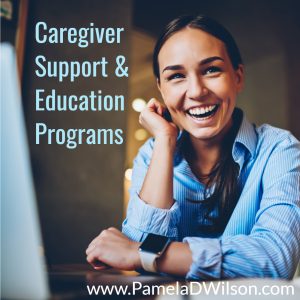 Are hip fractures for elderly parents serious—yes. Are injuries and health emergencies for persons of all ages serious—they can be depending on the circumstances.
Are hip fractures for elderly parents serious—yes. Are injuries and health emergencies for persons of all ages serious—they can be depending on the circumstances.
You owe it to yourself to gain knowledge about ways to remain healthy physically and mentally so that you can live the best life possible.
Looking For Help Caring for Elderly Parents? Find the Information Including Step-by-Step Processes in Pamela’s Online Program.
©2022 Pamela D. Wilson All Rights Reserved

